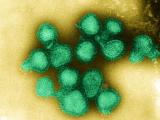Aug 6, 2010 (CIDRAP News) – About 16 million remaining doses of monovalent 2009 H1N1 vaccine made by Sanofi Pasteur and packaged in multidose vials will expire sooner than expected, but expiration dates have not yet been determined, federal health officials and the company said today.
The vaccine was made with an expected 18-month shelf life, said Donna Cary, Sanofi spokeswoman in Swiftwater, Pa. "There's a possibility that some of them may fall below the potency specification before the 18 months are up, so we reached out to FDA [the Food and Drug Administration] and CDC [the Centers for Disease Control and Prevention] about a process to get this vaccine taken care of," she said.
The CDC issued a Health Alert Network e-mail notice about the shortened shelf life late yesterday.
The company and CDC said the doses are the only remaining monovalent 2009 H1N1 vaccine formulation in the United States that has not yet expired or been recalled. The doses currently meet all quality, safety, and potency standards, officials said.
Cary couldn't give the current expiration dates for the vaccine doses, which consist of a number of lots produced at different times in 2009. Also, she couldn't predict how much the shelf life for the vaccine will be shortened, as that will be decided by the FDA after the company files information with the agency.
A Sanofi statement noted that supplies of the 2010-11 seasonal flu vaccine, which includes the 2009 H1N1 strain, are already being shipped. Hence, "there is an alternative for immunization against this strain. Disposal of the earlier monovalent vaccine eliminates an opportunity for vaccine mix-up and administration error."
After Sanofi gets the FDA's approval to change the expiration dates, it will notify providers who received the product about the lot numbers and the new dates, Cary said.
She said it wasn't clear why the CDC issued a notice about the vaccine so soon, since the expiration dates have not yet been changed. She speculated that the agency may be getting questions about the vaccine.
Cary said the reason for the unexpectedly early decline in potency of the vaccine is not clear.
Unexpired monovalent H1N1 vaccine can still be useful in certain people, according to online guidance from the CDC. Among them are children and adults who have not had any doses of the vaccine and will be traveling to places where they could be exposed to the pandemic H1N1 virus before the 2010-11 seasonal vaccine becomes available in September.
The CDC's Advisory Committee on Immunization Practices recommends that children between 6 months and 8 years old who have not had any doses of 2009 H1N1 vaccine should get two doses of the 2010-11 seasonal vaccine (which includes 2009 H1N1), even if they have had a previous seasonal flu vaccine.
See also:
CDC notice about Sanofi monovalent H1N1 vaccine
http://www2a.cdc.gov/HAN/ArchiveSys/ViewMsgV.asp?AlertNum=00317
CDC guidance on use of monovalent H1N1 vaccine
http://www.cdc.gov/flu/about/qa/infohealthcare.htm




















